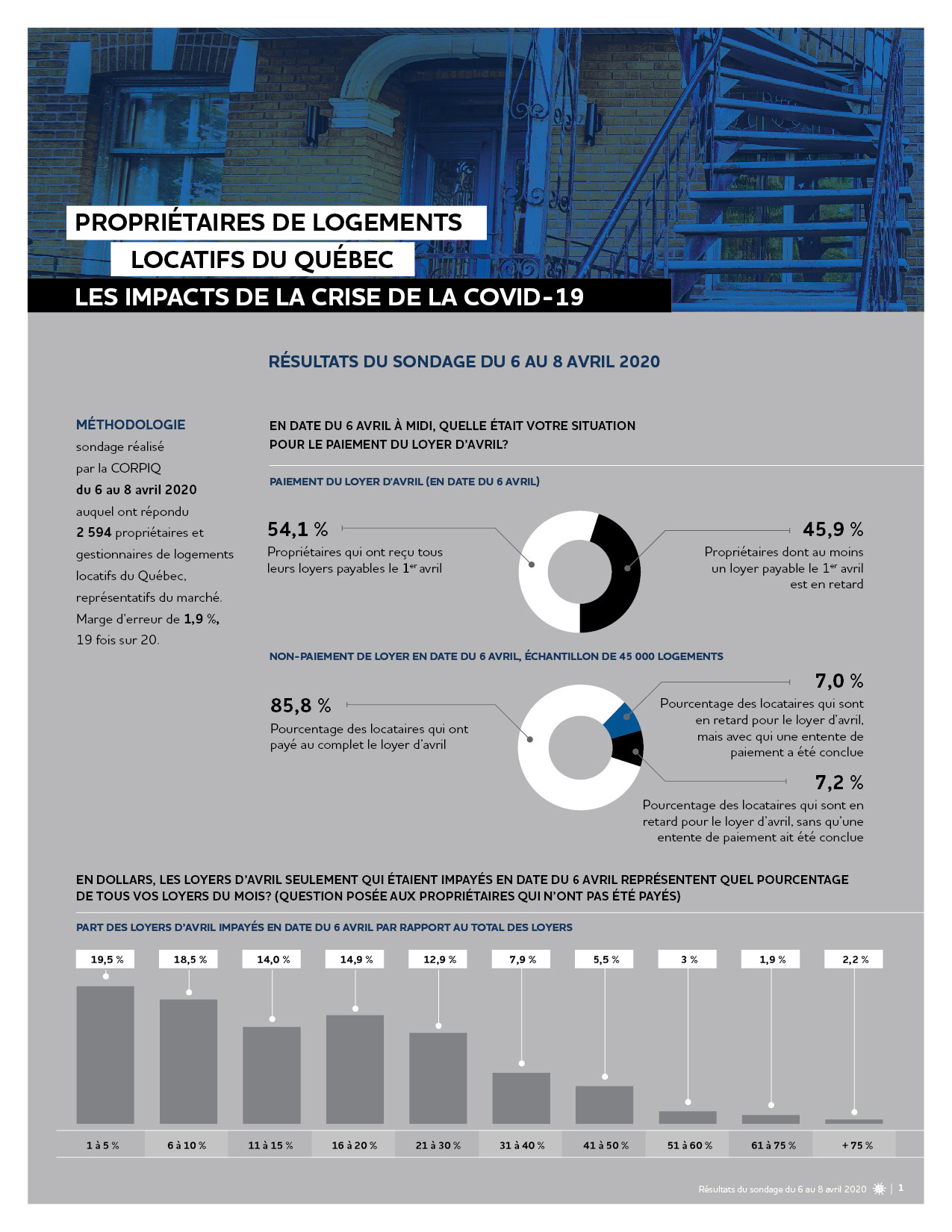One out of two landlords have to deal with unpaid rents for April
Press Releases
As of April 6, 46% of landlords had not yet received all their monthly rents, for a total of $148 million, estimates CORPIQ, based on a survey of 2594 respondents.

As of April 6, 46% of landlords had not yet received all their monthly rents, for a total of $148 million, according to CORPIQ, based on a survey of 2594 respondents (1).
More specifically, 14% of tenants were in arrears with their rent as of April 6, representing more than 185,000 households. It should be noted that the average rent in Quebec is $800 and there are 1.3 million renter households in private dwellings.
"This is an unprecedented crisis and it is a colossal sum that landlords must bear, while continuing to provide housing and its services," deplored CORPIQ's director of public affairs, Hans Brouillette.
The good news is that three out of four landlords (72%) have made an agreement with at least one of the tenants whose April rent was unpaid after one week, in order to help them get through this difficult period.
However, 47% of landlords with unpaid rents did not have an agreement with at least one defaulting tenant. The parties may have spoken but not agreed, or the tenant may not have come forward.
Among the tenants who are defaulting on their rent payments as of the beginning of April, CORPIQ expects that many of them will still pay in the coming days, thanks to the promised government assistance. If this is not the case, it is in their best interest to find common ground with their landlord to avoid trouble. In fact, while 4% of landlords intend to file a request with the Régie du logement now, the rate will increase to 25% when the rent is more than 3 weeks late. An additional 10% of landlords will take the case to court if the rent for May isn’t paid.
"The figures show that Quebec landlords are showing flexibility and understanding, so that tenants have time to receive government assistance. Once the assistance is received, it goes without saying that the tenants will have to pay their rent", Hans Brouillette reminds us.
"The federal government assistance will have to be used for urgent essential needs such as food, rent and medication. With the $2,000 per month for individuals who have lost their source of income, there is no reason for a tenant to accumulate a debt that he or she will not be able to repay, with the consequences that would entail," adds CORPIQ spokesperson.
Many landlords have also lost their income
A majority of landlords are wage earners or entrepreneurs, which explains why a large proportion of them also suffer the impacts of the paralysis of the economy on their personal income.
More than 43% of landlords or their spouses have currently lost some or all of their personal income other than rent. Overall, two-thirds (67%) of landlords believe they may eventually have trouble paying their mortgage.
Those who have contacted their financial institution have found that arrangements are possible, however interest will apply on any deferred payments.
CORPIQ is asking governments to help landlords as well.
While the governments of Canada and Quebec are orchestrating the implementation of assistance programs for businesses and individuals, nothing has yet been announced to compensate landlords who must continue to provide the essential service of housing, without any guarantee that they will eventually be paid for rent. Hearings and evictions for non-payment of rent are suspended, and they have no way to limit their losses.
(1) Survey conducted by CORPIQ from April 6 to 8, 2020 to which 2594 landlords and managers of rental housing in Quebec, representative of the market, responded. Margin of error of 1.9%, 19 times out of 20.
 Skip site navigation
Skip site navigation

